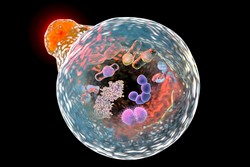Influenza targets autophagy for immune evasion
Eukaryotic cells degrade intracellular material in the proteasome and through autophagy. Autophagy entails the engulfment of cytosolic material such as proteins and entire organelles in double-membrane vesicles, which finally fuse with lysosomes. It is central for providing energy to cells under starvation, while emerging evidence also demonstrate a role in immunity. Indeed, reports link autophagy with pathogen sensing, inflammasome activation and regulation of pattern recognition receptor (PRR) signalling. In addition, autophagy is instrumental for antigen presentation to T cells and pathogens have evolved mechanisms to target autophagy-mediated mechanisms. Furthermore, macroautophagy is required for memory B, memory T, effector T and Treg cell survival at steady-state and in influenza infection, indicating that the role of autophagy in influenza virus infection might be cell-type dependent. Scientists of the EU-funded FLUPHAGY (Regulation of macroautophagy by viral pathogens) project wished to investigate how the influenza virus affects the autophagy machinery, and interferes with antigen delivery and processing. Previous work by the partners had shown that autophagy deficiency in macrophages and dendritic cells leads to improved antigen presentation due to increased cell surface levels of MHC class I. Also, influenza virus is capable of arresting the fusion of autophagosomes with lysosomes in vitro. However, the underlying mechanism is unknown. To delineate the association between influenza virus and autophagy, researchers employed a mouse model of autophagy deficiency specifically in lung cells, the primary target of influenza virus infection. These animals, following infection with influenza virus, presented with higher viral titres and enhanced pathology. Interestingly, these observations were virus subtype specific. Overall, understanding the intricate relationship between influenza virus and the macroautophagy machinery will support the search for new ways to target infection. Furthermore, the study findings will help optimise influenza vaccine development to aid those patients who suffer from severe symptoms such as the elderly or immunocompromised patients.







